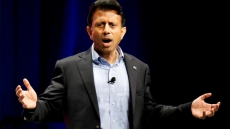MONTREAL — A little-publicized bill that is making its way through Quebec's legislative process has digital-law experts and others worried that the concept of a free and open Internet is being threatened in the province.
Bill 74 includes a provision that seeks to force Internet service providers to block Quebecers' access to online gambling sites that aren't approved by the government.
The province's finance minister says the bill is necessary to protect the health and safety of Quebecers because illegal sites don't apply the same "responsible gaming rules" as sites run by the government and pose a "risk to the population."
Critics say the Internet-censoring legislation — unprecedented in Canada — is a way for Quebec's state-owned gambling authority to block competition and could lead to governments across the country deciding what citizens can and can't view online.
Moreover, law experts say the legislation violates freedom of expression, contradicts federal telecommunications law and will likely be challenged in court by Internet companies and civil rights groups.
"I think the (Quebec) government doesn't understand the Internet and frankly doesn't understand the importance of an open and free Internet," said the University of Ottawa's Michael Geist, a renowned online-law expert.
"Net neutrality" is understood to mean that Internet companies should be neutral carriers of content and not favour some sites over others or block access to certain sites.
The federal government included the principle in the 1993 Telecommunications Act, which states "Except where the Commission (the CRTC) approves otherwise, a Canadian carrier shall not control the content or influence the meaning or purpose of telecommunications carried by it for the public."
Quebec's government-run gambling authority, Loto-Quebec, has been losing money to online gaming competitors, according to the 2015-16 budget documents.
"Illegal websites do not apply the same responsible gaming rules" as the government, the budget reads. "They thus pose a risk to the population, especially young people."
The government's plan, the document continues, "would increase the dividend that Loto-Quebec pays to the government by $13.5 million in 2016-17 and $27 million a year thereafter."
Bill 74 states that "an Internet service provider may not give access to an online gambling site whose operation is not authorized under Quebec law."
Geist said the Quebec government has a host of alternatives to prevent gaming companies from operating in the province, such as going after online payment companies like PayPal and asking them not to process transactions from such sites.
Additionally, the government can ask the gaming companies themselves to limit their offerings in the province, he said, similar to the way American entertainment firms like Hulu or the U.S. version of Netflix block their content from streaming in Canada.
Bram Abramson, chief legal and regulatory officer for TekSavvy Solutions Inc., an Internet provider that services 300,000 homes in Canada, said the law would be "extremely complicated and extremely costly."
"What they're asking us to do is wall off Quebec and to run our network differently and separately," he said. "It's a question of redesigning our network from the ground up."

Abramson added that if Quebec passes Bill 74, telecom companies such as his would be caught between that legislation and the federal Telecommunications Act.
"We're looking very closely at what can be done and we're doing it actively," he said.
Julius Grey, a Montreal-based constitutional and human rights lawyer, said the bill potentially violates freedom of expression.
The Supreme Court of Canada ruled citizens' rights aren't only protected when it comes to expressing ideas, but that people also have the fundamental right to hear and read things, he explained.
"I want this law to be challenged," Grey said.
Grey and Geist both said they worry about how the bill could lead to the Quebec government banning access to other online content, such as sites that violate the province's strict language laws or sites that include hate speech.
"I haven't seen anything like this in Canada," Geist said, adding the only content currently blocked is child pornography.
"That's a whole other issue because the content itself is different."
Audrey Cloutier, a spokeswoman for Finance Minister Carlos Leitao, said the government has to force Internet providers to block non-authorized gambling sites because it's not realistic to imagine Quebec could persuade foreign companies to voluntarily stop offering their services.
She said problem gambling is a health issue which falls under provincial jurisdiction.
"Loto-Quebec and our government have constitutional competence and the responsibility to act to protect citizens by offering regulated, responsible, honest and secure gambling."
Geist said the bill undermines Canadian values.
"We are a free and democratic society," he said. "And I think we don't believe in Chinese-style approaches where government decides what kinds of sites the public is entitled to access."




